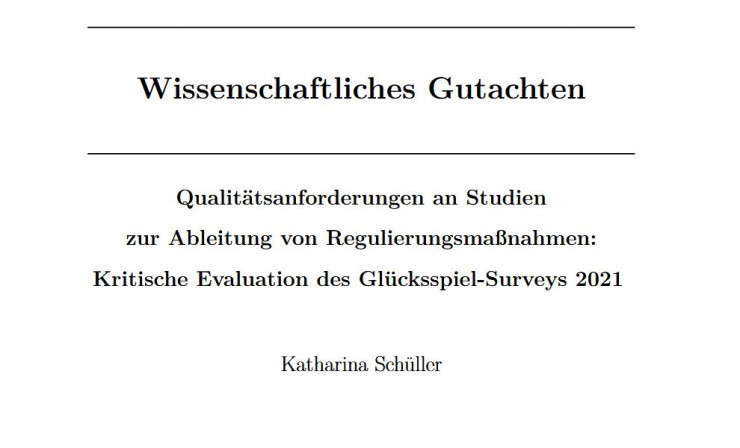Major study on gambling behaviour in Germany criticised in principle

Gambling in Germany and its regulation is a constant topic of discussion. In this context, studies are regularly carried out to examine specific aspects. The Gambling Survey 2021 is one of them. It focuses in particular on the gambling behaviour of the population and possible related problems. This study has now been fundamentally criticised by the renowned statistician Katharina Schüller.
In recent weeks and months, we have reported on a number of gambling-related studies in Germany: the GGL recently published a study on player protection, the Glücksspiel Atlas provided interesting information on possible changes to the GlüStV 2021, and GambleJoe itself conducted an impact analysis of the new regulations under the GlüStV 2021.
Gambling in Germany is clearly a topic that is well worth investigating. Time and again, we, our readers and/or other bodies have found certain inconsistencies which have long since affected not only the facts investigated, but also the analyses themselves. Vague descriptions of study processes (GGL Player Protection Study) or too little reference to the requirements of typical players (Gambling Atlas) are just two striking examples.
But that was peanuts compared to the headwinds currently facing the Gambling Survey 2021! According to its initiators, the study is intended to "contribute to the further improvement of epidemiological findings on gambling participation and problems in the German population". The renowned statistician Katharina Schüller recently criticised the study in an expert report: "No scientific basis", "serious methodological errors", "lack of scientific transparency" and similar terms were used in this context (also in the press).
How did the criticism come about?
Statistician Katharina Schüller prepared a report together with Prof. Dr. Ralf Münnich of the University of Trier, President of the German Statistical Society. The experts were commissioned by a number of German gambling associations after they identified significant shortcomings in the gambling survey. Schüller confirmed deficiencies in control, methodology and results.
The bottom line was this: Schüller denied the suitability of the survey as a scientific basis for a political discussion on problem gambling. This is mainly due to serious methodological errors in data collection and analysis. Those responsible for the study would most likely massively overestimate the number of problem gamblers in Germany.
What is the 2021 Gambling Survey?
The Gambling Survey 2021 is a population study on gambling behaviour in Germany. It focuses on answering the questions "How many people participate in gambling?", "Who plays gambling games?", "How often do people play gambling games?", "Where do people play gambling games?", "Which gambling games are played?" and "How common is gambling disorder?". The data was collected through telephone and online surveys. The study was conducted by the Institute for Interdisciplinary Addiction and Drug Research (ISD) and the University of Bremen.
The 2021 Gambling Survey shows deficits in control, methodology and results
Control
The authors of the 2021 Gambling Survey concluded that 2.3 percent of all 18- to 70-year-olds in Germany have a gambling disorder. 5.7 percent showed "risky gambling behaviour".
The main difficulty here is that the figure of 0.73 percent of problem gamblers previously determined by the Federal Centre for Health Education in 2019 was exceeded many times over. This large difference should have led to an independent quality control of the survey results. However, no such review has yet been carried out.
Methodology
In terms of methodology, the majority of shortcomings have been identified in relation to the 2021 Gambling Survey. The shortcomings are particularly evident in the following four areas.
- Data not representative: Schüller criticises the fact that a large number of respondents tend to refuse to answer telephone and online surveys. The quality of the data is therefore low, which means that the survey is not really representative of the population as a whole. It is very likely that there are fewer problem gamblers than assumed.
- Unsuitable methods for data collection and analysis: The statistician also criticised the fact that those responsible for the study had made serious technical errors. In particular, the weighting methods used were inappropriate. In addition, more attention should have been paid to random fluctuations.
- Future developments were ignored: Another criticism is that the gambling survey only provides a snapshot. An outlook on the possible development of gambling problems is neither given nor possible.
- No scientific transparency: Those responsible for the survey do not disclose which data was collected in detail, how the survey was conducted and which analysis methods led to the results. Even when asked, Schüller did not receive any further information. In her opinion, this is not only non-transparent, but also clearly goes against the principles of good science.
Results
For Katharina Schüller, all the difficulties mentioned above lead to a misleading overall picture. Most readers are likely to be easily persuaded in a direction that gambling in Germany is not taking at all. They would thus become "victims of flawed scientific work".
Conclusion
Image source: Screenshot von https://www.automatenwirtschaft.de/wp-content/uploads/2023/09/Wissenschaftliches-Gutachten-Kritische-Evaluation-des-Gluecksspiel-Surveys-2021.pdf

0 Comments to: Major study on gambling behaviour in Germany criticised in principle
Our community thrives on your feedback - so let us know what you think!
Would you like to write comments on GambleJoe yourself? Then just create a GambleJoe User Account.